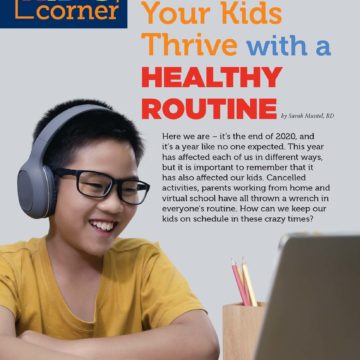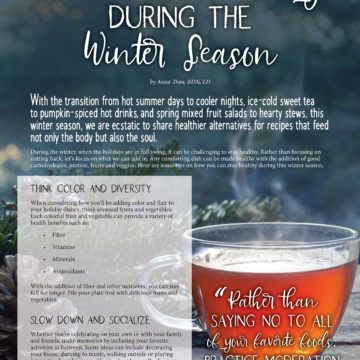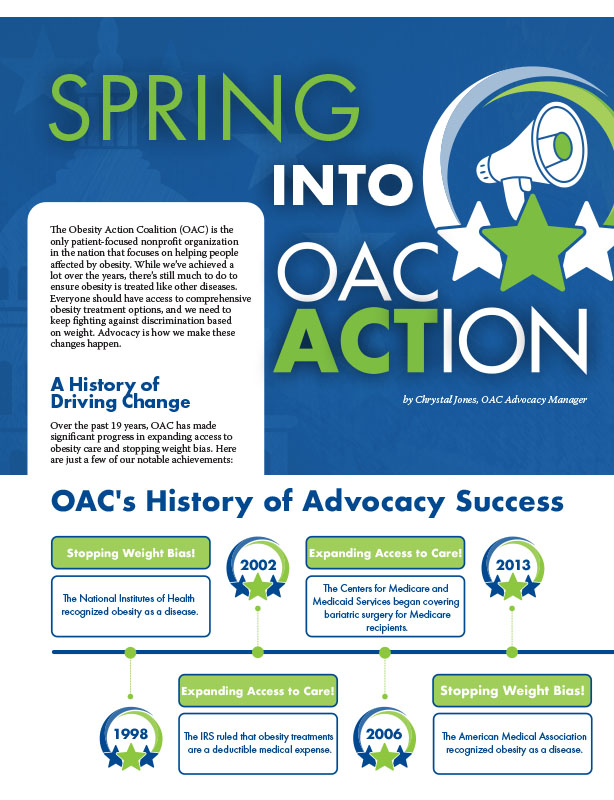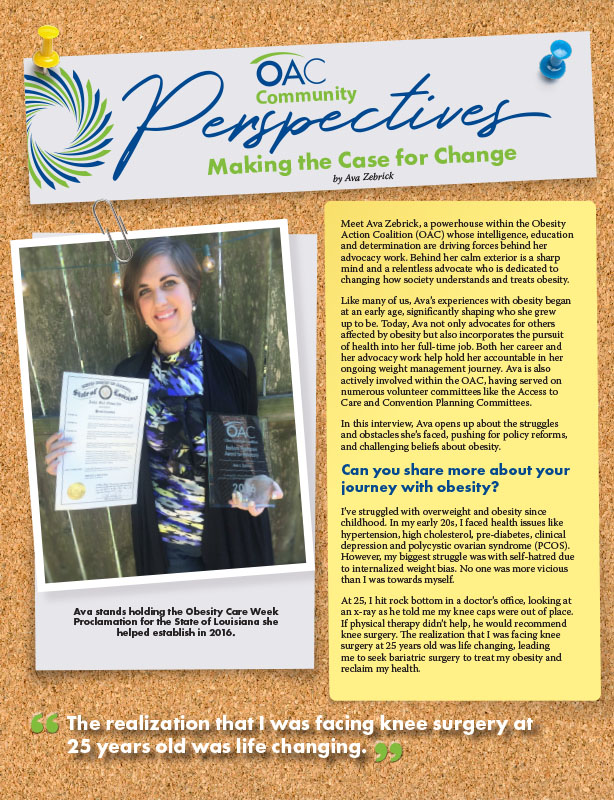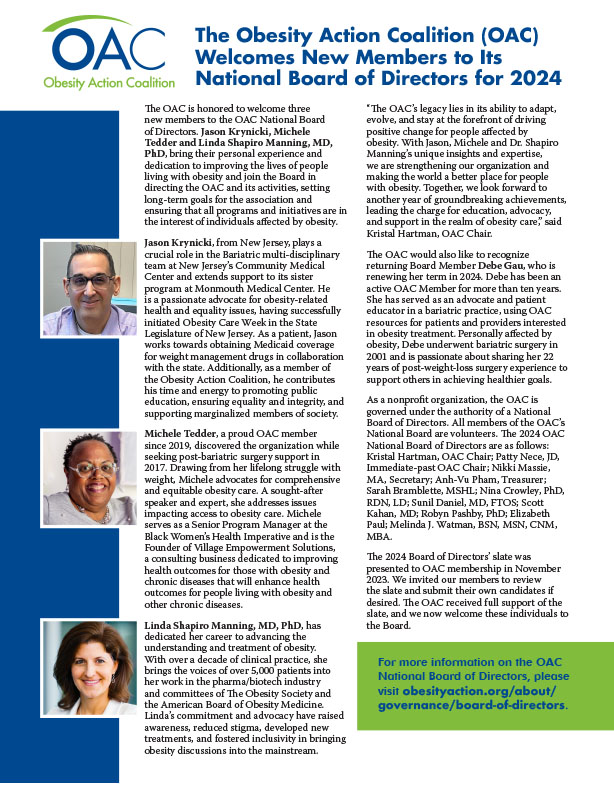Internalized Weight Bias: Recognizing its Impacts

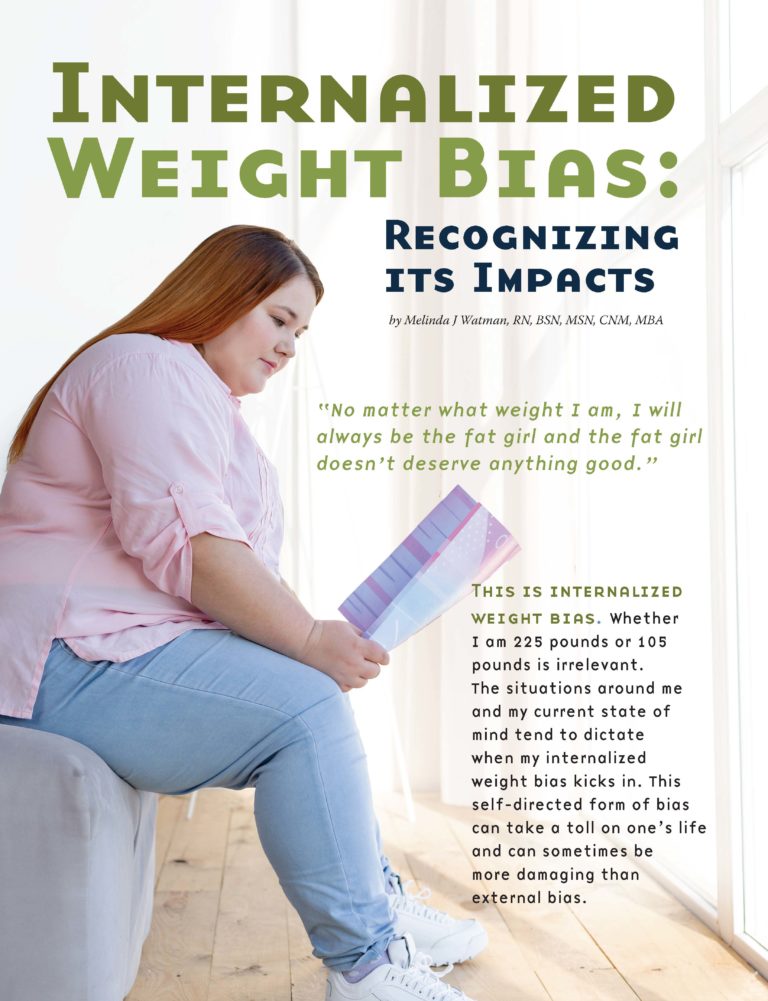
by Melinda J Watman, RN, BSN, MSN, CNM, MBA
Winter 2021
“No matter what weight I am, I will always be the fat girl and the fat girl doesn’t deserve anything good.”
This is internalized weight bias. Whether I am 225 pounds or 105 pounds is irrelevant. The situations around me and my current state of mind tend to dictate when my internalized weight bias kicks in. This self-directed form of bias can take a toll on one’s life and can sometimes be more damaging than external bias.
What is Internalized Weight Bias?
In order to tackle internalized weight bias, we need to first look at weight bias in general. The Obesity Action Coalition (OAC) defines weight bias as the following:
Negative attitudes, beliefs, judgments, stereotypes, and discriminatory acts aimed at individuals solely because of their weight. It can be overt or subtle and occur in any setting, including employment, healthcare, education, mass media and relationships with family and friends.
It also takes many forms – verbal, written, media, online and more. Weight bias is dehumanizing and damaging. It can cause adverse physical and psychological health outcomes and promotes a social norm that marginalizes people.
Those with obesity experience weight bias by people who think it is their right to humiliate, degrade and disrespect them. Weight bias can be shown by anyone and, unfortunately, is usually socially accepted.
When bombarded with hurtful and hateful messages, it can be difficult to not believe them. By internalizing these insults, we create internalized weight bias. We take these messages and translate them into our own self-directed insults and injuries. It is a vicious cycle resulting in self-deprecating messages – or what I have come to call “self-put-downs.” Our inner self agrees with outside opinions and behaviors and internalized weight bias becomes a part of our belief system.
Psychological and Behavioral Effects
The reason that weight bias and internalized weight bias are so damaging is because of the psychological and behavioral effects that it can have on a person. Researchers and health professionals have found that people who have internalized weight bias may experience these psychological and behavioral effects:
Psychological:
- Reduced quality of life
- Depression
- Anxiety
- Low self-esteem
- Poor body image
Behavioral:
- Disordered eating
- Rejection of dietary advice
- Avoidance of exercise
Further research is being done to better understand the full relationship of these outcomes and determine if there are therapeutic ways to combat their effects.
How Does Internalized Weight Bias Affect You?
I spoke with several people to get a sense of how their internalized weight bias affects their life and relationships. This is what they had to say:
“When I meet someone in person for a first date, I’m sure he is going to look at me and think, “I could never be with someone that fat.” But I usually find fatal flaws with him so I can reject him before he can reject me. I had these thoughts when I weighed 100 pounds more and I have them now.”
“Whenever I go to a restaurant, I am embarrassed to have people watch me eat. I feel like people think I shouldn’t be eating something because I am fat or because it will make me fat. The only reason I believe this is because it comes from within – I believe it myself. And my actual weight has no bearing on this thought.”
“I went for my annual physical having lost 30 pounds. I was feeling quite happy about this and somewhat proud. When the physician came in and read my chart, he looked at me and said about my weight loss – is that all? Needless to say, I was crushed. I left the appointment feeling like I was a failure and that I would never conquer my weight goals. And if that was the case, why bother? I immediately bought ‘bad’ food and proceeded to eat my way over the thirty pounds I had lost.”
If you have a story about experiencing external or internal weight bias, you can share it to the OAC’s story-sharing platform at WeightoftheWorld.com.
Learning to Cope
Most of us with obesity are vulnerable to internalized weight bias and have few coping mechanisms to combat it. We feel we deserve to think of ourselves in these negative ways. We believe that it is our fault that we are overweight or struggle with obesity, and that because of this, we should beat ourselves up and support the external biases that come our way.
It is crucial that we find ways to cope with internalized and external weight bias. Personally, I found that exercise helped me. I learned from a very early age that being heavier in school meant being mocked by my peers and never being picked for sports. It didn’t take long for this to become ingrained in me to the point where I avoided exercise at all costs.
A few years ago, I signed up for a 5k. The moment I signed up, I began feeling anxious and afraid. I had self-doubt and the voices in my head seemed to be getting louder and louder. Eventually, I completed the 5k and was one of the last ones to finish the race. I beat myself up for not being a better athlete and running faster, but ultimately I was proud of myself and what I accomplished.
It’s important to work through those voices in your head and not let them control your life. Push yourself and try to remind yourself that your weight does not define you as a person. External and internal weight bias can be overwhelming and difficult to manage. However, you have to find ways to cope with the voices in your head to get some relief. Even if you don’t feel better right away, keep fighting.
Take Control
It is amazing how hard on ourselves we can be. Internalized weight bias can pop up and at times, be more potent than bias from external sources. It is an area that needs more studying and while this is being done, there are ways to help yourself. Rely on those who know and care about you. Let them support you and make you feel valued. Become part of a community such as OAC’s where there are no judgments and people are genuinely interested in YOU. Share your thoughts and feelings if and when you think you can. Most importantly, fight the voices in your head that say you aren’t good enough and listen to the ones that remind you of why you are more than enough.
About the Author:
Melinda Watman, RN, BSN, MSN, CNM, MBA, is an outspoken patient voice for the ongoing struggles that obesity presents – medical, psychological and physical. Her own personal journey with obesity has led to an understanding of the challenges that people affected by obesity are regularly faced with. She is dedicated to educating the public about weight bias and helping to eliminate it. Her work on the OAC National Board of Directors as well as other obesity-related nonprofits gives her the opportunity to further this goal as well as others.
by Chrystal Jones, OAC Advocacy Manager Spring 2024 The Obesity Action Coalition (OAC) is the only patient-focused…
Read Articleby Ava Zebrick Spring 2024 Meet Ava Zebrick, a powerhouse within the Obesity Action Coalition (OAC) whose…
Read ArticleThe OAC is honored to welcome three new members to the OAC National Board of Directors. Jason Krynicki,…
Read Article




